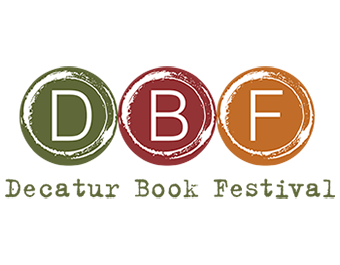
Open your mind at this year’s festival and step outside your comfort zone, whether that means looking into a different genre, a new perspective or a topic that’s foreign to you. We will use the hashtag #READdifferent to celebrate that challenge at the AJC DBF. The festival provides a breadth of content to give nearly everyone an opportunity to #READdifferent.
Not sure where to start on your journey of literary exploration and discovery? We’re here to help! Each week we will be featuring a new theme or genre that you can use to READdifferent at the 2016 AJC Decatur Book Festival.
Each year, the DBF Science track, sponsored by the Atlanta Science Tavern, creates an atmosphere of possibility, of exploration, of making the unknown known. Our science track aims to link lofty academics with colloquial communication, and science-related presentations are some of the more thought-provoking and well-attended events at the festival. These locally and nationally acclaimed mathematicians and scientists will get a whole new part of your brain kicking into gear.
Mapping the Heavens: The Radical Scientific Ideas that Reveal the Cosmos provides a tour of the “greatest hits” of cosmological discoveries—the ideas that reshaped our universe over the past century. Priyamvada Natarajan, our guide to these ideas, is someone at the forefront of the research—an astrophysicist who literally creates maps of invisible matter in the universe. She not only explains for a wide audience the science behind these essential ideas but also provides an understanding of how radical scientific theories gain acceptance.
What separates your mind from an animal’s? Maybe you think it’s your ability to design tools, your sense of self, or your grasp of past and future―all traits that have helped us define ourselves as the planet’s preeminent species. In Are We Smart Enough to Know How Smart Animals Are?, world-renowned primatologist Frans De Waal breaks ground on work involving animal intelligence. Based on research involving crows, dolphins, parrots, sheep, wasps, bats, whales, and of course chimpanzees and bonobos, he explores both the scope and the depth of animal intelligence. He offers firsthand accounts of how science has stood traditional behaviorism on its head by revealing how smart animals really are, and how we’ve underestimated their abilities for too long.
In The Fate of Gender: Nature, Nurture, and the Human Future, former NPR science reporter Frank Browning explores human gender geographies around the world. As Browning reports his stories, he also elucidates the neuroscience that distinguishes male and female biology. Linking science to culture and behavior, Browning questions the traditional division of nature versus nurture in everything from plant science to sexual expression.
Over the last century, the search for human ancestors has spanned four continents and resulted in the discovery of hundreds of fossils. While most of these discoveries live quietly in museum collections, there are a few that have become world-renowned celebrity personas¬–ambassadors of science that speak to public audiences. In SEVEN SKELETONS: The Evolution of the World’s Most Famous Human Fossils, historian of science Lydia Pyne explores how seven such famous fossils of our ancestors have the social cachet they enjoy today.
Ever wonder about the evolution of mathematics in its relation to Hindu gods and goddesses? Ken Ono, in his autobiography My Search for Ramanujan, devoted his mathematical career to understanding how in his short life, the famous Indian mathematical prodigy Srinivasa Ramanujan was able to discover so many deep mathematical truths, which Ramanujan believed had been sent to him as visions from a Hindu goddess. Ono’s search for Ramanujan ranges over three continents and crosses paths with mathematicians whose lives span the globe.
Are risk-takers born or made? Why are some more willing to go out on a limb (so to speak) than others? How do we weigh the value of opportunities large or small that may have the potential to change the course of our lives? These are just a few of the questions that author Kayt Sukel tackles in The Art of Risk, offering an in-depth look at risk-taking and its role in the many facets of life that resonates on a personal level.
